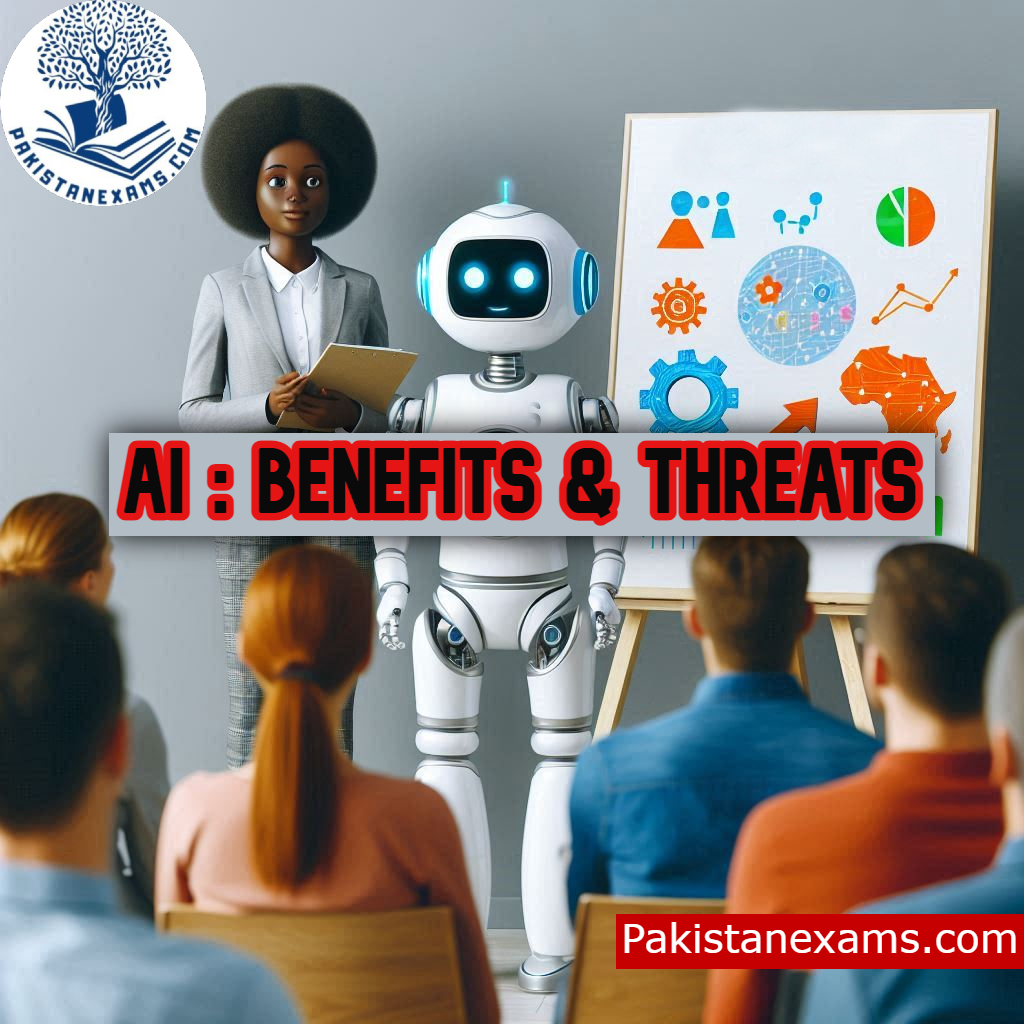1. Introduction
Thesis Statement: Artificial Intelligence is key today. It brings big improvements to many areas, but it also has serious problems that can be risky. Still, people can deal with those problems if they’re careful.
2. Overview of AI
3. Benefits of Artificial Intelligence
- Advancements in Healthcare
- Efficiency in Business Operations
- Enhancements in Daily Life
- AI in Climate Change Mitigation
- AI in Governance
- AI in Education
4. Threats of Artificial Intelligence
- Job Displacement and Economic Impact
- Privacy and Security Concerns
- Ethical and Moral Implications
- AI in Military and Cybersecurity
5. Balancing Benefits and Threats
- Regulation and Policy
- Ethical AI Development
- Education and Workforce Training
6. Conclusion
Artificial Intelligence (AI) is now a part of our everyday lives, not just a science fiction idea. Today, it affects many areas of our lives, from work to daily interactions. Artificial Intelligence (AI), which means making machines that can think and learn like humans, has come a long way since it started. This growth has brought great benefits that can change many fields, but it also brings serious risks. Balancing these benefits and threats is crucial for using AI’s full potential while minimizing its risks. AI offers significant benefits in various sectors but also poses considerable threats that must be managed responsibly.
Artificial Intelligence (AI) is the creation of computer systems that can do tasks usually needing human intelligence. These tasks involve learning, thinking, solving problems, seeing, and understanding language. The idea of AI started in the mid-20th century, with early research focusing on basic problem-solving and logic. Over the years, AI has moved through different stages, including machine learning, where programs learn from data, and deep learning, which uses complex neural networks. Today, AI is everywhere, from virtual assistants like Siri and Alexa to self-driving cars and advanced medical tools. These advancements make AI a key part of modern life, driving innovation and efficiency in many areas.
One of the biggest benefits of Artificial Intelligence (AI) is its impact on healthcare. AI technologies help doctors diagnose diseases more accurately and create personalized treatment plans. For example, AI can analyze medical images better than human doctors, finding diseases like cancer earlier. Furthermore, AI speeds up medical research and the discovery of new drugs by analyzing large amounts of data quickly. These advancements in healthcare demonstrate AI’s potential to improve patient outcomes significantly.
Similarly, in business Artificial Intelligence makes operations more efficient and helps in making better decisions. AI can automate repetitive tasks like data entry and customer service, cutting costs and boosting productivity. Additionally, AI’s ability to analyze big data helps businesses understand market trends and customer preferences, leading to better strategic decisions. This capability not only boosts competitiveness but also fosters innovation in the business sector.
Likewise, Artificial Intelligence (AI) also improves daily life through smart home technology and transportation. AI-powered devices like smart thermostats and security systems make homes more convenient and safe. In transportation, AI-driven navigation systems and self-driving cars promise safer and more efficient travel. These technologies show AI’s potential to enhance quality of life and streamline everyday activities.
Furthermore, in the military, Artificial Intelligence helps with decision-making and logistics, giving a strategic advantage. Autonomous drones and defense systems can carry out complex missions accurately, reducing the risk to human soldiers. AI also assists in real-time data analysis and threat assessment, improving response times and strategic planning. Thus, AI’s role in the military significantly enhances mission effectiveness and safety.
Artificial Intelligence is also important in fighting climate change. Predictive models powered by AI can forecast weather and climate patterns, helping in disaster preparedness. Moreover, AI optimizes renewable energy sources by analyzing usage patterns and making energy distribution more efficient, supporting a sustainable future. These applications highlight AI’s potential in addressing global environmental challenges.
In Addition, in governance, AI makes public services more efficient and helps in policy-making through data analysis. AI systems can handle and analyze large datasets to find trends and issues, leading to better decisions. This efficiency improves public service delivery, from healthcare to transportation, making governance more effective and responsive.
Additionally, education benefits from Artificial Intelligence through personalized learning. AI platforms can adapt to each student’s needs, providing custom content and feedback. This personalization improves learning outcomes and makes education more inclusive. Additionally, AI increases administrative efficiency, letting educators focus more on teaching.
Despite its benefits, AI has serious threats, especially to jobs and the economy. Automation can replace many jobs, particularly those involving routine tasks, leading to unemployment. This job loss can increase economic inequality, as people without advanced skills may find it hard to get new jobs. Moreover, the gap between those with and without access to AI technology could also grow. Thus, the economic impact of AI poses significant societal challenges.
Furthermore, privacy and security are major concerns with Artificial Intelligence. The large amounts of data needed for AI systems raise the risk of data breaches and misuse of personal information. Additionally, AI-powered surveillance tools threaten privacy and could be abused by governments. These privacy and security issues highlight the need for robust safeguards and regulations.
The ethical and moral issues of AI are significant. Artificial Intelligence systems in critical decision-making, like law enforcement and healthcare, need to operate fairly. However, AI can unintentionally reinforce existing biases, leading to unfair outcomes. Furthermore, ethical concerns arise when AI is used in life-or-death decisions, such as autonomous weapons or self-driving cars, highlighting the need for strong ethical standards and oversight.
In military and cybersecurity areas, AI presents new risks. Autonomous weapons could lead to more intense conflicts if not properly controlled. Moreover, AI’s capabilities in hacking and cybersecurity make it easier for malicious actors to launch sophisticated attacks, disrupting important systems and stealing sensitive information. These threats underline the importance of developing and implementing effective AI regulations.
To balance AI’s benefits and risks, comprehensive regulation and policy are necessary. Governments should work together to create international standards to ensure AI technologies are developed and used responsibly. These rules should cover data privacy, ethical AI use, and preventing harmful applications. Effective regulation can help mitigate AI’s risks while promoting its benefits.
Promoting ethical AI development is essential. AI systems need to be transparent and accountable to build trust and ensure fairness. This includes making AI algorithms understandable and testing them for biases. Additionally, diversity in AI development teams can help reduce biases and create more inclusive technologies. Ethical AI development is crucial for achieving fair and reliable AI systems.
Education and workforce training are vital to address job displacement from AI. Reskilling programs can help workers move to new jobs that need advanced skills. Including AI education in school curriculums from an early age will prepare future generations for an AI-driven world. These educational initiatives are key to ensuring a workforce that can effectively engage with AI technologies.
In conclusion, while Artificial Intelligence offers great benefits that can change healthcare, business, daily life, military applications, climate change efforts, governance, and education, its threats, including job displacement, privacy concerns, ethical issues, and cybersecurity risks, must not be ignored. Balancing these benefits and risks requires comprehensive regulation, ethical development practices, and proactive education and training. By adopting a responsible approach to AI development and use, society can harness AI’s full potential while protecting against its risks, ensuring AI contributes positively to human progress.

